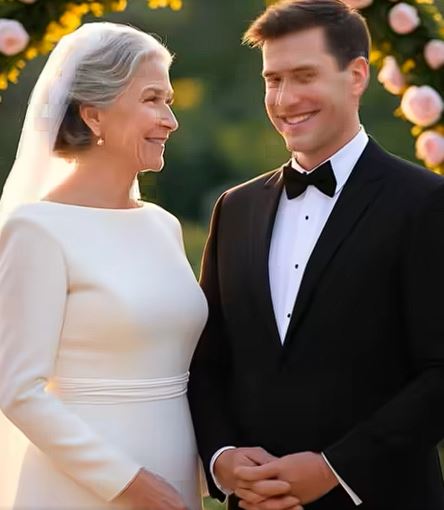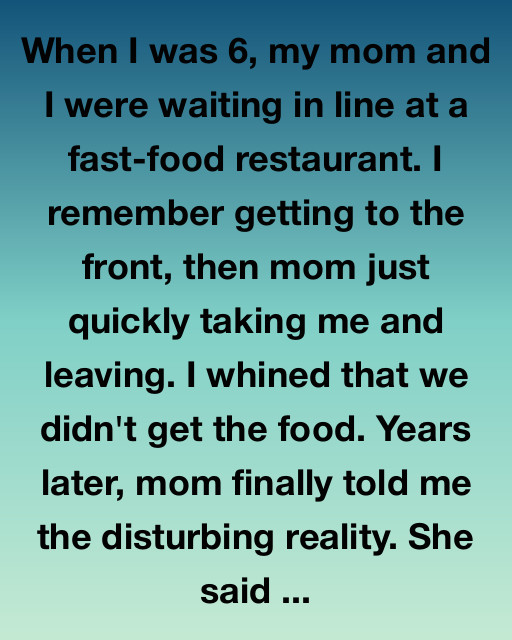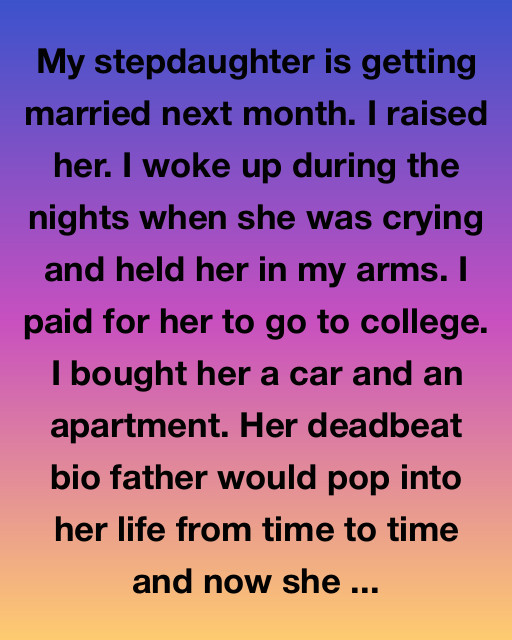Everyone at the courthouse assumed I was her grandson. The clerk even winked. But I was marrying Imelda—71, Cuban, sharp as hell—and I meant it. Or thought I did.
We met at a charity art auction. I was catering, she was bidding five grand on a painting of a horse with a mohawk. We talked. She said I had “curious eyes” and handed me her card. Her condo smelled like Chanel and old wood, and she played salsa like a teenager who never gave it up.
I won’t lie—part of me liked the comfort. She paid when we went out. She bought me vintage boots and poured me espresso like we were in a noir film. But I also liked her. She listened. She asked me things no one else ever did.
A week after we got married—on a sticky July morning—she made breakfast, set the plate in front of me, and sat across the table with her hands folded like she was about to lead a prayer.
She asked if I’d do her one favor. Just one.
“After it’s done, you can go if you want,” she said.
I laughed, thinking it was something sweet.
But then she pulled out a sealed envelope, slid it to me like a drug deal, and whispered—
“Take this to the man in Flatbush. Don’t read it. Don’t ask. And never tell anyone I sent you.”
Her eyes were wet but cold. Like she was mourning something that hadn’t happened yet.
I picked up the envelope. It was heavier than it looked.
The name on the front just said Pablo. No last name. No address, either—just “Flatbush, Avenue J, pink awning.” That was it.
“Is this safe?” I asked.
“If I tell you yes, you won’t believe me,” she said, sipping her cortado like we weren’t in the middle of something sketchy.
So the next morning, I took the Q train down, the envelope stuffed inside my jacket. Sweating like I’d swallowed guilt. The pink awning wasn’t hard to find. It was over a locksmith shop that looked like it hadn’t changed since 1982.
Inside, the air smelled like rust and coffee. A man in a checkered shirt sat behind the counter, polishing a key. I stood there until he looked up.
“You Pablo?” I asked.
He nodded once, like he already knew I was coming.
I handed him the envelope. He didn’t open it. He just stared at it, then put it inside a little drawer beneath the counter. Then he said, “You married her, huh?”
I froze. “How’d you—”
“She always said she would send someone one day. Never thought it’d be a kid.”
I wanted to ask questions, but something in his face told me I wouldn’t like the answers. So I left. Didn’t look back.
When I got home, Imelda was on the balcony watering her ferns, wearing one of those silk robes she somehow made elegant even in flip-flops. She didn’t ask if I delivered it. She just nodded once and made us spaghetti with sardines like it was a normal Tuesday.
And things were normal after that. For a while.
We settled into a rhythm. Morning walks. Cafecito breaks. She taught me how to play dominoes “like a Cuban, not like a tourist.” I even started helping her with her art—she painted huge, strange murals of birds trapped in chandeliers. We’d paint together, shoulder to shoulder, her humming Celia Cruz while I blended the blues.
Then one night, maybe three months in, the buzzer rang at 2 a.m.
I jolted awake. Imelda didn’t move. She was already sitting up in bed, fully alert, like she’d been expecting it.
“Stay here,” she said.
She slipped out of bed, pulled on her robe, and walked to the door with the steadiness of someone who’d walked into storms before. I followed anyway.
At the door stood a woman about her age, with sharp cheekbones and a white streak in her braid. They stared at each other like mirrors with too much history.
“Did he get it?” the woman asked.
Imelda nodded.
The woman sighed, then turned to me. “You know nothing. Keep it that way.”
Then she left. No name. No explanation. Nothing.
Imelda didn’t say a word for the rest of the night. She just sat on the couch, smoking a cigarette even though she hadn’t smoked in years.
The next day, she asked if I’d consider going to Cuba with her. “Just for a week,” she said. “It’s time I see someone.”
I didn’t ask who. We flew out on a Wednesday.
The trip was…odd. She kept me close, but never introduced me to anyone. Every cab ride was paid in cash. Every conversation in hushed Spanish I couldn’t quite follow. She visited one man—a bedridden priest—who cried when he saw her, but wouldn’t look at me.
On the plane ride back, I finally asked, “Who was Pablo?”
She didn’t answer. Just whispered, “Thank you.”
Then, not long after we got back, her health started slipping.
At first it was little things—forgetting the stove, repeating herself. But by December, it was worse. She was falling. She couldn’t always find the bathroom. She started calling me by the wrong name—”Matías.” I didn’t know who that was.
We saw doctors. They said early-onset dementia, though at 71, it wasn’t exactly early. Still, I stayed. People thought I was in it for the money, but there wasn’t much. The condo was hers, but that was it. No secret fortune. No offshore account.
Then one day, cleaning out her desk, I found a stack of old letters.
Dozens. All unopened. All from the same sender: Matías Delgado. Addressed from somewhere in Tampa.
I opened one.
Mi querida,
If you ever forgive me, send word. I still have the locket.
Always, M.
I confronted her. She was lucid enough to understand.
“That’s my son,” she said quietly. “He thinks I abandoned him. I didn’t. His father took him. I was seventeen. No rights. No voice.”
She looked like someone who’d kept the ocean inside her for decades.
“The envelope,” I said. “Was it for him?”
She shook her head. “No. That was about something else. That was about them.”
She didn’t explain. Couldn’t, maybe.
She passed away the following spring.
The funeral was small. Just a few neighbors, her cousin Mireya from Queens, and me. I gave a little speech, barely holding it together. No sign of Matías.
Afterwards, I went through her things slowly. Room by room. Drawer by drawer. I kept the painting of the mohawk horse. I sold her vintage scarves to a girl on Etsy who cried when she saw the collection.
Then, a month after her death, a man came to the door.
He was in his forties, tan, with eyes too familiar. He introduced himself as Mateo, said he was the nephew of Pablo.
“I heard she passed,” he said. “I wanted to tell you something.”
I let him in.
We sat at the tiny kitchen table, same spot where she handed me the envelope. He pulled a small velvet pouch from his jacket and set it between us.
Inside was a ring. Gold, with a single ruby.
“She sent this to Pablo years ago. Told him to hold onto it until she found peace. That envelope you brought—it was a letter of forgiveness. Not to Pablo. To the man who hurt her. A man Pablo hated. It was her way of ending the chain.”
He smiled softly. “You helped her do that.”
I didn’t say anything. Just held the ring in my palm, suddenly feeling the full weight of her story—everything she never said, everything she tried to bury.
A few weeks later, I found Matías.
It took some digging—Facebook rabbit holes, an old church registry—but I found him in Tampa. He ran a small auto shop. I sent him a letter.
Not from Imelda. From me.
I told him a little of who I was. What I knew. That she kept all his letters. That she never stopped missing him.
Three weeks later, he replied. Short note. Shaky handwriting.
Thank you. I always wondered if she remembered me. I’m glad someone loved her at the end.
He included a photo—him with his kids. Imelda’s grandchildren.
I hung it up in the condo. Right beside the mohawk horse.
Now, it’s been three years since she passed. I still live in her place, though I’m slowly changing it. Less velvet, more plants. I started teaching art at a youth center nearby. I use her brushes, though I’ll never paint like her.
I think about her every morning when I make my coffee. When I walk down Flatbush. When I see an old woman laugh too loud in public.
Imelda was many things—bold, flawed, complicated. But she knew how to break a cycle. Even if it took a lifetime.
Sometimes, love doesn’t look like forever. Sometimes, it looks like a sealed envelope and a favor. And sometimes, the people who change your life are the ones everyone else refuses to understand.
If you’ve ever loved someone others didn’t approve of—or carried a secret you weren’t sure how to share—know this:
Redemption doesn’t always roar. Sometimes, it whispers through actions. And forgiveness? That’s the loudest whisper of all.
If this story moved you, share it with someone who still believes in second chances ❤️
And don’t forget to like—your support helps these true, messy stories keep coming.




